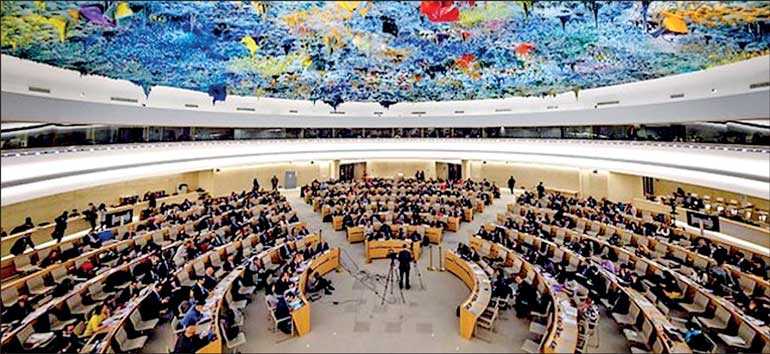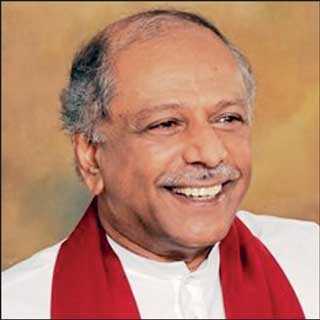Thursday Feb 19, 2026
Thursday Feb 19, 2026
Wednesday, 22 July 2020 00:00 - - {{hitsCtrl.values.hits}}

The United Nations has
expressed concern as well
as sought clarification on
Sri Lanka’s intended
policies with regard to
addressing enforced
disappearances and recent statements from the Government and developments on this issue. This was via a joint
communication to Sri Lanka
Minister for Foreign Affairs Dinesh Gunawardena, the Working Group on Enforced or Involuntary Disappearances, the Special Rapporteur on
extrajudicial, summary or
arbitrary executions, the Special
Rapporteur on the situation of human rights defenders and the Special Rapporteur on the promotion of truth, justice, reparation and guarantees of non-recurrence has expressed concern and seek clarifications on the Government of Sri Lanka’s intended policies with regards to addressing enforced disappearances in the country and recent statements from the Government and developments on this issue.
Full text of the communication fellows:
Ms. Dayani Mendis, Chargé d’affaires a.i., Deputy Permanent Representative.
Permanent Mission of the Democratic Socialist Republic of Sri Lanka to the United.
Nations Office and other international organisations in Geneva.
Please find attached a joint communication sent by the Working Group on Enforced or Involuntary Disappearances; the Special Rapporteur on extrajudicial, summary or arbitrary executions; the Special
 |
|
Dinesh Gunawardena |
Rapporteur on the situation of human rights defenders; and the Special Rapporteur on the promotion of truth, justice, reparation and guarantees of non-recurrence. I would be grateful if this letter could be transmitted at your earliest convenience to His Excellency Mr. Dinesh Gunawardena, MP, Minister for Foreign Affairs.
Mandates of the Working Group on Enforced or Involuntary Disappearances; the Special Rapporteur on extrajudicial, summary or arbitrary executions; the Special Rapporteur on the situation of human rights defenders; and the Special Rapporteur on the promotion of truth, justice, reparation and guarantees of non-recurrence.
We have the honour to address you in our capacities as Working Group on Enforced or Involuntary Disappearances; Special Rapporteur on extrajudicial, summary or arbitrary executions; Special Rapporteur on the situation of human rights defenders; and Special Rapporteur on the promotion of truth, justice, reparation and guarantees of non-recurrence, pursuant to Human Rights Council resolutions 36/6, 35/15, 34/5 and 36/7.
Our purpose in writing is to express concern and seek clarifications on the Government of Sri Lanka’s intended policies with regards to addressing enforced disappearances in the country and recent statements from the Government and developments on this issue.
We note with concern the announcement by Sri Lanka that it intends to withdraw from the co-sponsorship of the process initiated by Human Rights Council resolution 30/12 and we encourage the Government to reconsider its approach. While we welcome information that the Government remains committed to achieving accountability and human rights, towards sustainable peace and reconciliation, we believe the engagement with the Human Rights Council process has an important role to play in achieving these aims.
We welcome assurances in official statements that the Office of the Missing Persons (OMP) and the Office of Reparations will continue to operate. However, we note that the Government indicated it would take “appropriate adaptation in line with the Government policy framework”.
We would like to underline the importance of ensuring that the OMP’s independence is scrupulously respected and that it is provided with adequate resources to effectively fulfil its mandate. Pursuant to article 12 of the International Convention for the Protection of All Persons from Enforced disappearance (CED), which Sri Lanka ratified on 25 May 2016, we underscore your Excellency’s Government’s obligation to ensure impartial and thorough investigations into enforced disappearances, with the competent authorities having the necessary powers and resources to conduct the investigation effectively.
We further wish to emphasise that any adaptation of the OMP’s work should be done in full consultation with relevant civil society actors as well as victims, and in compliance with international standards. We  would like to take this opportunity to request additional detailed information on the adaptions envisaged and the Government’s policy framework in this regard. We would additionally like to highlight that victims have a right to obtain reparation and prompt, fair and adequate compensation (article 24 of CED). We also encourage the Government to consider the families of disappeared, who may face specific challenges at this time, in any relief measures planned to address COVID-19.
would like to take this opportunity to request additional detailed information on the adaptions envisaged and the Government’s policy framework in this regard. We would additionally like to highlight that victims have a right to obtain reparation and prompt, fair and adequate compensation (article 24 of CED). We also encourage the Government to consider the families of disappeared, who may face specific challenges at this time, in any relief measures planned to address COVID-19.
Full Statement by Hon. Dinesh Gunawardena, Minister of Foreign Relations, Skills Development, Employment and Labour Relations of Sri Lanka to the Human Rights Council, 43rd Regular Session, Agenda
Item 2 General Debate and Full Statement by Hon. Dinesh Gunawardena, Minister of Foreign Relations, Skills Development, Employment and labour Relations of Sri Lanka to the Human Rights Council, 43rd Regular Session, High-Level Segment 2 A/HRC/RES/30/1, Promoting reconciliation, accountability and human rights in Sri Lanka with the Human Rights Council process has an important role to play in achieving these aims.
We welcome assurances in official statements that the Office of the Missing Persons (OMP) and the Office of Reparations will continue to operate. However, we note that the Government indicated it would take “appropriate adaptation in line with the Government policy framework. We would like to underline the importance of ensuring that the OMP’s independence is scrupulously respected and that it is provided with adequate resources to effectively fulfil its mandate. Pursuant to article 12 of the International Convention for the Protection of All Persons from Enforced disappearance (CED), which Sri Lanka ratified on 25 May 2016, we underscore your Excellency’s Government’s obligation to ensure impartial and thorough investigations into enforced disappearances, with the competent authorities having the necessary powers and resources to conduct the investigation effectively.
We further wish to emphasise that any adaptation of the OMP’s work should be done in full consultation with relevant civil society actors as well as victims, and in compliance with international standards. We would like to take this opportunity to request additional detailed information on the adaptions envisaged and the Government’s policy framework in this regard. We would additionally like to highlight that victims have a right to obtain reparation and prompt, fair and adequate compensation (article 24 of CED). We also encourage the Government to consider the families of disappeared, who may face specific challenges at this time, in any relief measures planned to address COVID-19.
We note the information presented to the Human Rights Council that steps may be taken to issue death certificates or certificates of absence, while also providing livelihood and other assistance to affected families. In this respect, we recommend that Sri Lanka takes appropriate steps with regard to the legal situation of disappeared persons whose fate has not been clarified, including legal frameworks for their relatives in fields such as social welfare, financial matters, family law and property rights. We stress that such assistance is particularly pressing the current circumstances, and should be provided without prejudice to the obligation to continue the investigation until the fate of the disappeared person has been clarified and that, even in the case of death, Sri Lanka is required to take all appropriate measures to locate, respect and return the remains (Art 24 CED).
Our concerns are heightened by information that a Commission of Inquiry appointed by the President to look into alleged “political victimisation” has purported to order the Attorney General to halt legal proceedings in ongoing disappearance cases. We welcome information that national law enforcement systems will continue to investigate and prosecute cases on all allegations of torture and other human rights violations that are Full Statement, Agenda Item 2 Delivered Text, statement by Hon. Dinesh Gunawardena, Minister of Foreign Relations, Skills Development, Employment and labour Relations of Sri Lanka to the Human Rights Council, 43rd Regular Session, Agenda Item 2 Gazette 2157/44 of 9 January 2020 currently before the judicial processes, and hope this includes the emblematic enforced disappearances cases which are currently being tried.
We are alarmed by information that Former Army sergeant Sunil Ratnayake was granted a Presidential Pardon in March 2020 after being convicted of the murder of eight civilians including children. Sri Lanka has an obligation to hold criminally responsible perpetrators of enforced disappearances and other serious violations under international humanitarian law, as well as certain superior officers (article 6 CED and customary international humanitarian law), and to impose sanctions that are appropriate and proportionate to the crime committed.
With regard to the allegations of surveillance, harassment and reprisals targeting certain human rights defenders and civil society actors, we welcome the Government’s commitment to ensure that complaints received on alleged attacks are investigated and prosecuted.8 We would like to take the opportunity to refer to communications sent to the Government raising allegations of this type to which we have not received a reply, including communications LKA 5/20199 and LKA 2/201810.
We remind that individuals including witnesses, relatives and defence counsels should be protected against any form of intimidation, harassment or ill-treatment and that the Government has the duty to guarantee the right to form and participate freely in organisations and associations concerned with attempting to establish the circumstances of enforced disappearance, the fate of disappeared persons and to assist victims of enforced disappearances (article 12 and 24 CED). We hope that detailed replies will be received to the questions raised in these communications and to any future communications on the issue, so that an effective and constructive dialogue can be pursued with the Government on these important matters.
We note with concern that the aforementioned statements have heightened fears amongst families with regards to the process going forward for finding out the fate and whereabouts of their disappeared relatives. Under International law, families have the right to know the truth regarding the circumstances of the enforced disappearance of their relatives, the progress and the results of the investigations and the fate of the disappeared person (article 24 CED).
We welcome assurances that Sri Lanka will continue to engage in a constructive manner with the regular processes and mechanisms of the UN including the Special Procedures.11 We hope this will include implementation of the recommendations made by the Working Group on Enforced or Involuntary Disappearances after their visit to Sri Lanka in report A/HRC/33/51/Add.212 and in the follow up report on the visit https://spcommreports.ohchr.org/TMResultsBase/DownLoadPublicCommunicationFile?gId=24987
The Working Group also reiterates its readiness to assist Sri Lanka in the implementation of these recommendations and in addressing the issue of enforced disappearances in line with its obligations under the CED. As it is our responsibility, under the mandates provided to us by the Human Rights Council, to seek to clarify all issues brought to our attention, we would be grateful for any information or comment you may wish to provide on the above mentioned areas and for detailed information on the Government’s intended policies with regards to addressing enforced disappearances in the country and to implement its obligations under the Convention for the Protection of All Persons from Enforced disappearance. We would appreciate receiving a response within 60 days. Passed this delay, this communication and any response received from your Excellency’s Government will be made public via the communications reporting website. They will also subsequently be made available in the usual report to be presented to the Human Rights Council.
Please accept, Excellency, the assurances of our highest consideration.
Luciano Hazan
Chair-Rapporteur of the Working Group on Enforced or Involuntary Disappearances
Agnes Callamard
Special Rapporteur on extrajudicial, summary or arbitrary executions
Mary Lawlor
Special Rapporteur on the situation of human rights defenders
(Source: https://srilankabrief.org/2020/07/un-expresses-concern-and-seek-clarifications-on-the-govt-of-sri-lankas-intended-policies-with-regards-to-addressing-enforced-disappearances/)